I think Orange may be nearing a record for a series that’s made me go “Hmmm” the most times in two episodes.
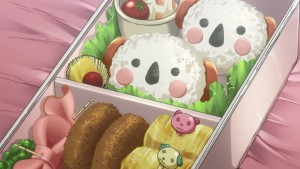 Well, first off, that was an exceptional episode – let’s get that straight. I would say hand’s down the best of the season so far, but I’ve seen Mob Psycho 100 Episode 2 and most of you haven’t, so I’ll hold my fire on that question for now. There was one cautionary note, though, and it was hidden in plain sight in the closing credits: namely, this episode had 17 Animation Directors. Those of us who follow anime production know that can be a very worrying sign indeed, especially when we’re dealing with a studio of modest means like Telecom Animation Films (though they do have bigger dogs like TMS providing production assistance). It’s clear that the story is more than strong enough to carry the series, but it’d be a shame if the beautiful visuals we saw in the premiere gave way to production delays and cost-cutting.
Well, first off, that was an exceptional episode – let’s get that straight. I would say hand’s down the best of the season so far, but I’ve seen Mob Psycho 100 Episode 2 and most of you haven’t, so I’ll hold my fire on that question for now. There was one cautionary note, though, and it was hidden in plain sight in the closing credits: namely, this episode had 17 Animation Directors. Those of us who follow anime production know that can be a very worrying sign indeed, especially when we’re dealing with a studio of modest means like Telecom Animation Films (though they do have bigger dogs like TMS providing production assistance). It’s clear that the story is more than strong enough to carry the series, but it’d be a shame if the beautiful visuals we saw in the premiere gave way to production delays and cost-cutting.
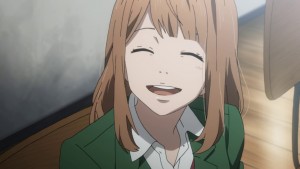 You’ll have to forgive me if I don’t reply much in the comments, because as a new viewer of Orange I’m obviously going to have to be very careful of mines. But frankly, I was surprised that the episode gave away as much as it did so early in the story. It was a fascinating exercise, trying to puzzle together just what was going on here – subtexts hidden inside of subtexts. But then Kakeru and Naho went and dropped massive spoiler bombs in the last five minutes of the episode, and that pretty much hit the reset button on the narrative. I’ve got a lot of faith in both the anime staff and Takano Ichigo after the first two eps, but I’ll have to adjust my approach now, because clearly this is a different kind of story than I initially thought.
You’ll have to forgive me if I don’t reply much in the comments, because as a new viewer of Orange I’m obviously going to have to be very careful of mines. But frankly, I was surprised that the episode gave away as much as it did so early in the story. It was a fascinating exercise, trying to puzzle together just what was going on here – subtexts hidden inside of subtexts. But then Kakeru and Naho went and dropped massive spoiler bombs in the last five minutes of the episode, and that pretty much hit the reset button on the narrative. I’ve got a lot of faith in both the anime staff and Takano Ichigo after the first two eps, but I’ll have to adjust my approach now, because clearly this is a different kind of story than I initially thought.
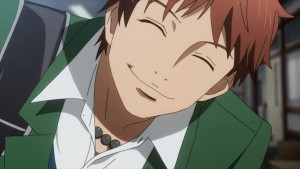 It’s been a long-standing tenet for me that the mistakes we regret the most in life are not things we did and wish we hadn’t, but things we didn’t do and wish we had. It’s also quite clear to me that this is a lesson we don’t generally learn until well into adulthood – if we learn it at all – and even once learned, it’s a hard one to live by. So this premise cuts pretty deep for me, watching young kids (most especially Naho of course) grapple with the crippling indecision and anxiety that’s a staple of adolescence (and often much longer) for so many. This is a very powerful metaphor – an adult writing to their teenage self and urging them to act rather than hesitate. But is the adult Naho really doing her adolescent self a favor here?
It’s been a long-standing tenet for me that the mistakes we regret the most in life are not things we did and wish we hadn’t, but things we didn’t do and wish we had. It’s also quite clear to me that this is a lesson we don’t generally learn until well into adulthood – if we learn it at all – and even once learned, it’s a hard one to live by. So this premise cuts pretty deep for me, watching young kids (most especially Naho of course) grapple with the crippling indecision and anxiety that’s a staple of adolescence (and often much longer) for so many. This is a very powerful metaphor – an adult writing to their teenage self and urging them to act rather than hesitate. But is the adult Naho really doing her adolescent self a favor here?
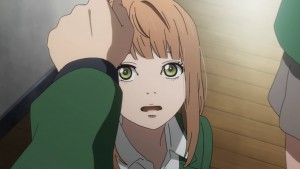 I was the tiniest bit concerned seeing Hamasaki Hiroshi’s name attached to Orange as director, because his work in that role in the past hasn’t been that notable apart from Steins;Gate – and that show had more directors than the DGA. But it seems I needn’t have worried, because his work on this series has been very impressive. He’s captured the tension inherent in the situation beautifully, realizing he doesn’t need to oversell it. And I love the way specific scenes are executed – as an example, Naho and her mother (played by the superb Inoue Kikuo) both wrestling with indecision (a reminder of the fact that this trait doesn’t necessarily leave us as we enter adulthood). I also loved the moment when Naho finally handed the bento to Kakeru – the way the tremor in her hands was passed to the lunchbox, momentarily stilled when Kakeru grasped it, then returned once he took it from her hands.
I was the tiniest bit concerned seeing Hamasaki Hiroshi’s name attached to Orange as director, because his work in that role in the past hasn’t been that notable apart from Steins;Gate – and that show had more directors than the DGA. But it seems I needn’t have worried, because his work on this series has been very impressive. He’s captured the tension inherent in the situation beautifully, realizing he doesn’t need to oversell it. And I love the way specific scenes are executed – as an example, Naho and her mother (played by the superb Inoue Kikuo) both wrestling with indecision (a reminder of the fact that this trait doesn’t necessarily leave us as we enter adulthood). I also loved the moment when Naho finally handed the bento to Kakeru – the way the tremor in her hands was passed to the lunchbox, momentarily stilled when Kakeru grasped it, then returned once he took it from her hands.
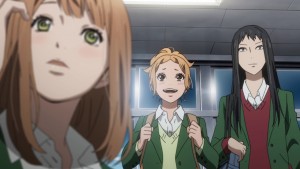 I would have to break this episode down to pre- and post-revelation, because learning what we did changed an awful lot. The dynamic between Naho, Kakeru and Suwa is a fascinating one. We know Naho and Suwa end up together – we only suspected it until the end of this ep, and Naho seemingly still doesn’t know – and there’s a clear attraction on Suwa’s part already. But his embrace of Kakeru into the group seems genuine, and he even seems to be pushing Kakeru and Naho together. Then there’s the matter of that bento box, which brought so much tension into the episode. Will she give it to him or won’t she? In hindsight of course Kakeru’s comment that his mom “won’t make me a lunch” takes on an entirely new and heartbreaking meaning. It was clear this boy was damaged in some way, but considering how fresh his wounds are, he masks them well.
I would have to break this episode down to pre- and post-revelation, because learning what we did changed an awful lot. The dynamic between Naho, Kakeru and Suwa is a fascinating one. We know Naho and Suwa end up together – we only suspected it until the end of this ep, and Naho seemingly still doesn’t know – and there’s a clear attraction on Suwa’s part already. But his embrace of Kakeru into the group seems genuine, and he even seems to be pushing Kakeru and Naho together. Then there’s the matter of that bento box, which brought so much tension into the episode. Will she give it to him or won’t she? In hindsight of course Kakeru’s comment that his mom “won’t make me a lunch” takes on an entirely new and heartbreaking meaning. It was clear this boy was damaged in some way, but considering how fresh his wounds are, he masks them well.
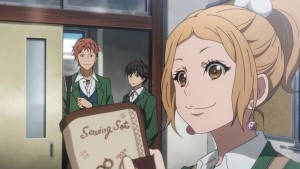 Even knowing what we know, I think there are some very fundamental questions at play here. Most fundamental of course is the matter of how the 26 year-old Naho managed to send a letter a decade into the past, but that’s not the key question for me – it’s more about housekeeping since the conceit requires suspension of disbelief. No, what I most want to know is this: just what does the adult Naho hope to achieve from this exercise? Does she intend to somehow save Kakeru, or is she simply trying to spare her teenage self (and by extension, herself) the agony of regret? To be honest I think that would be quite a selfish act, though understandable. But look at it this way – Naho seems to have found happiness with Suwa. They have a beautiful baby together. If Kakeru were somehow to be saved, wouldn’t that future be put at risk?
Even knowing what we know, I think there are some very fundamental questions at play here. Most fundamental of course is the matter of how the 26 year-old Naho managed to send a letter a decade into the past, but that’s not the key question for me – it’s more about housekeeping since the conceit requires suspension of disbelief. No, what I most want to know is this: just what does the adult Naho hope to achieve from this exercise? Does she intend to somehow save Kakeru, or is she simply trying to spare her teenage self (and by extension, herself) the agony of regret? To be honest I think that would be quite a selfish act, though understandable. But look at it this way – Naho seems to have found happiness with Suwa. They have a beautiful baby together. If Kakeru were somehow to be saved, wouldn’t that future be put at risk?
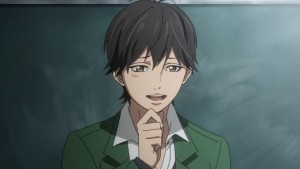 Obviously these are some pretty heavy issues we’re confronting here, and we’re only two episodes into a thirteen-episode run. As I said I’m a bit surprised that so much was revealed so soon, but the flipside of that is that there are so many potentially powerful permutations to this story that remain viable. Series like Orange are every reason to be sorry that shoujo manga aren’t adapted into anime more often, and that the ones chosen often aren’t the best of breed. But in a way I almost feel as if this is a series that’s dumped into the demographic by default, because it’s relationship-driven and it has a teenage female lead. Really, Orange is a dramatic story plain and simple, and it speaks more to the paucity of such stories in other demographics (like shounen) that it’s called a shoujo at all. But whatever else you call it, after two episodes I call it gripping and one of the best series of the year so far.
Obviously these are some pretty heavy issues we’re confronting here, and we’re only two episodes into a thirteen-episode run. As I said I’m a bit surprised that so much was revealed so soon, but the flipside of that is that there are so many potentially powerful permutations to this story that remain viable. Series like Orange are every reason to be sorry that shoujo manga aren’t adapted into anime more often, and that the ones chosen often aren’t the best of breed. But in a way I almost feel as if this is a series that’s dumped into the demographic by default, because it’s relationship-driven and it has a teenage female lead. Really, Orange is a dramatic story plain and simple, and it speaks more to the paucity of such stories in other demographics (like shounen) that it’s called a shoujo at all. But whatever else you call it, after two episodes I call it gripping and one of the best series of the year so far.


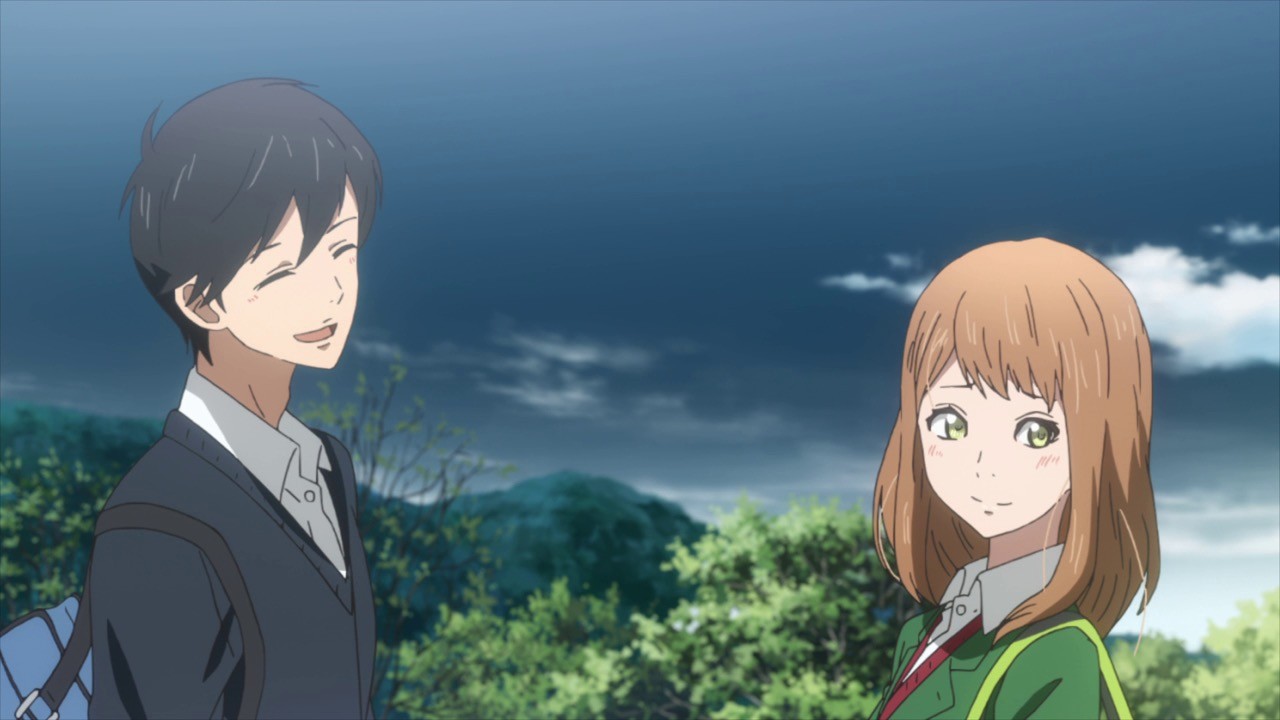
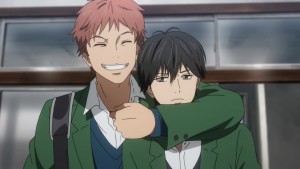
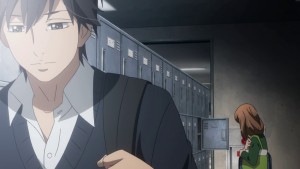
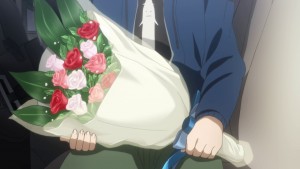
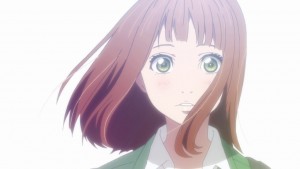
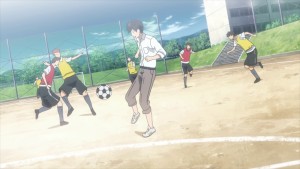

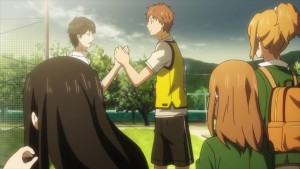
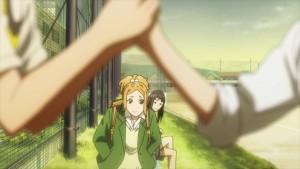
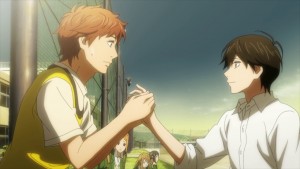
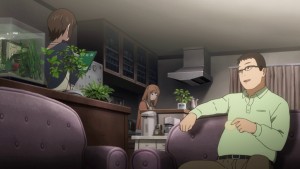
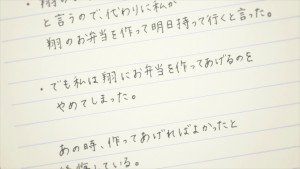
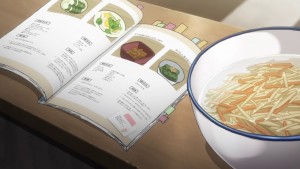
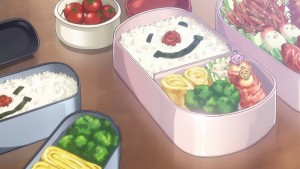
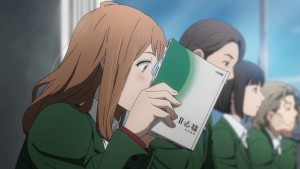
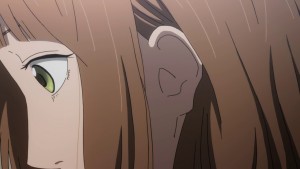
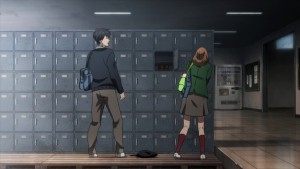
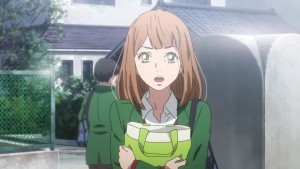
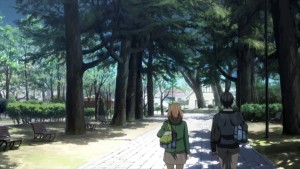
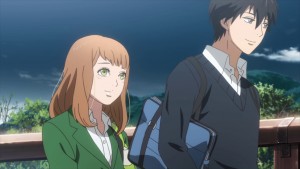
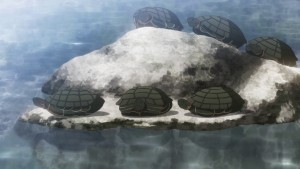
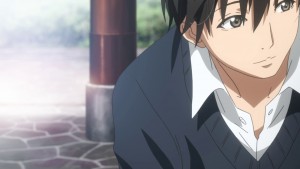
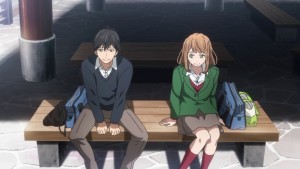
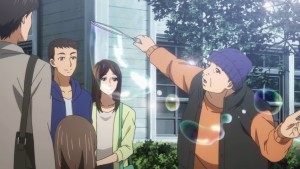
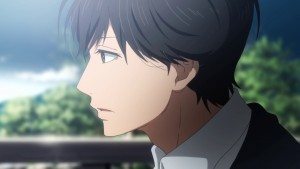
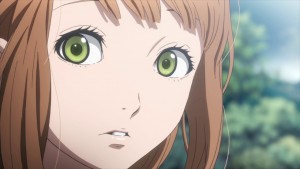
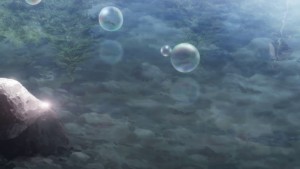
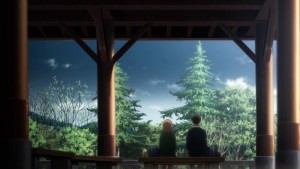
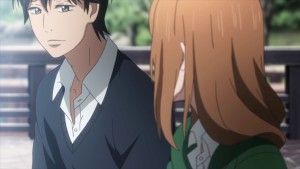
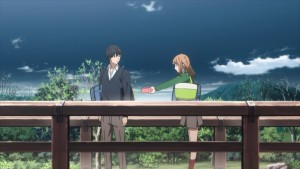
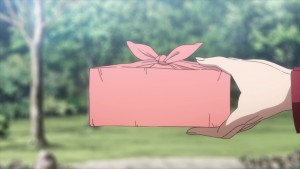
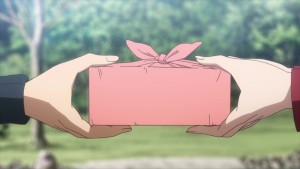
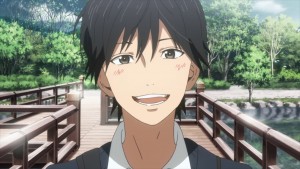
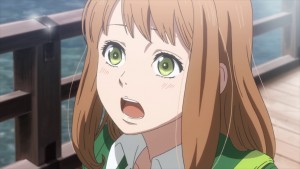
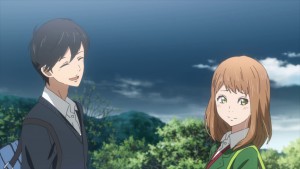
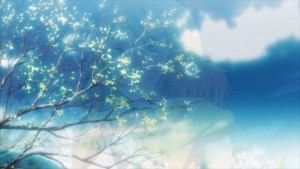
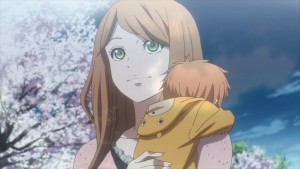
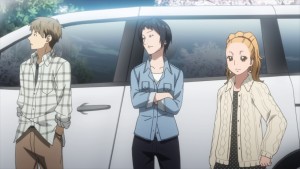
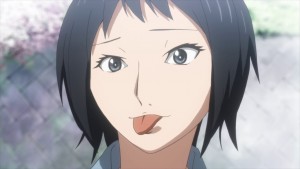
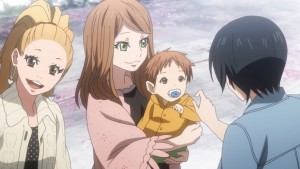
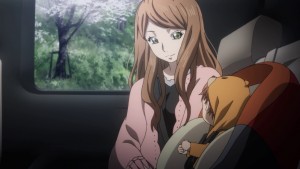
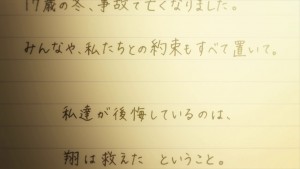
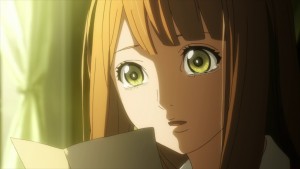
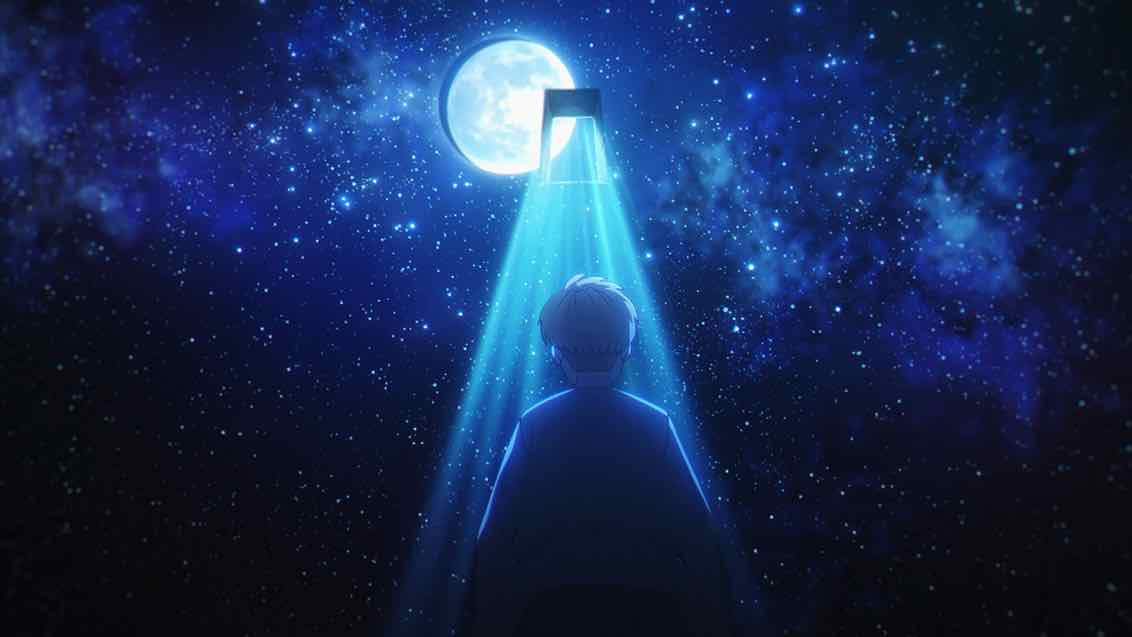
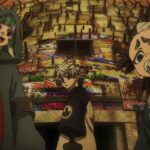
sonicsenryaku
July 10, 2016 at 6:01 pmIm a little conpuzzled as to why you had reservations about hiroshi as director; if there’s one thing this guy can do really well, it’s properly capturing the tone and atmosphere of a series. The guy’s pretty good all things considered (let’s forget terraformars was ever touched by him) so i knew we were in for some good stuff within the first few mins of ep 1. PS…you lucky bastard; cant wait for mob psycho 100. between it and one punch man, it’s definitely the superior story. MP 100 is a simple story, but what makes it such a good series is how it multiple interesting plot elements happening concurrently with each other without losing the cohesiveness of the narrative.
Dein
July 10, 2016 at 7:57 pmThe effects of the letter on the present is what interests me most right now. Does Naho hope to just ease her pain and bring back a good friend? Is she actually unhappy with her life to the point where she wants to change it? Or is her sending a letter just a selfish whim and she doesn’t quite grasp the potential consequences, if there are any?
Putting aside the complexities and finer details of the overaching plot, the slice of life elements of this series briefly reminded me of Glasslip, of all things. Or a version of Glasslip that actually knew what it was trying to do and why. Shrug. Either way, I’m enjoying it so far and the characters have a very tight grip on my hearstrings already.
DoubleQuarterPounder
July 10, 2016 at 8:44 pmGlasslip… ugh
Ronbb
July 10, 2016 at 9:51 pmorange just feels so genuine all in all, and I love it. I like how cinematic orange is, and I love how real the characters are — at times it felt like I was watching a live-action drama.
I’m wondering if Kakeru didn’t die at the end but was just separated from the group after high school. I’m not too concerned about the details, like how the letter got sent to the past or why Naho didn’t read the letter in one shot (maybe she did). Instead, I’m curious about what the 17 year-old Naho wrote to the 27 year-old Naho. Anyway, shoujo or not, I”m just glad that orange gets adapted and is in good hands.
TorahSylphwind
July 10, 2016 at 10:45 pmI did like younger Naho’s point that reading a letter can’t just change someone’s personality, even if the letter is from your future self. Really enjoying the chemistry between all the characters as well.
Stöt
July 11, 2016 at 4:06 amThey’re pretty openly tugging on your heartstrings with the premier episode. Oh yeah, this character that you fall in love with will die in the end, who wouldn’t react to that, I cynically thought. But then when the characters feel so genuine and the chemistry is great, the story doesn’t feel manipulative at all. It deals with the bombshells respectfully and expertly. Awesome.
And I also want to echo what TorahSylpwind said above. That was a key moment for me.
I’m a sucker for these misnomer “Shoujos”, and this is no exception. Sold.
Earthling Zing
July 11, 2016 at 5:39 amGreat episode and all, but what’s with streaming sites and their volume problems nowadays? The voices were way too soft, although you could say that it helped the unsettling atmosphere I guess…
Ronbb
July 11, 2016 at 10:07 pmSame here…I had real problem this week with Arslan Senki and could barely hear the voice actors.
Karmafan
July 12, 2016 at 7:04 pmI have 2 questions more about Japanese culture then the anime… As the 2 of them walk home she walks behind him instead of aside him. Is that some cultural thing where the girl has to follow the boy? The other thing is that there are 0 people of color in anime. The only time you see one is in a small role like the black Russian in Durarara or the lady cop in Michigo and Hatchin. You would think the anime culture would slowly start adding at least some people of color in animes. They need to start getting with the times.
Guardian Enzo
July 13, 2016 at 7:32 amTo the first question, if you go back to really traditional values (as Abe would like to) there is a thing where the wife will walk behind the husband typically. But I’ve never seen it have prevalence among high schoolers, and honestly I wouldn’t read much into that.
As to the second, well – you do understand that Japan is almost 99% ethnically Japanese, right? And that the vast majority of all immigrants in the country are from other Asian countries (especially Korea) and every time anything remotely Korean gets mentioned in anime the studio has to put an apology notice at the beginning of the episode. It’s an extremely homogeneous country that’s hostile towards immigration – that’s a real problem (not least because of catastrophic population decline) but it’s not at all surprising that you’d see almost no depiction of people of color in a country that has almost no people of color. And on the occasions when they do turn up I almost invariably wish they hadn’t.
Karmafan
July 13, 2016 at 9:14 amLike the astronaut in Space Brothers depicted as a Gorilla. Bad taste for sure.